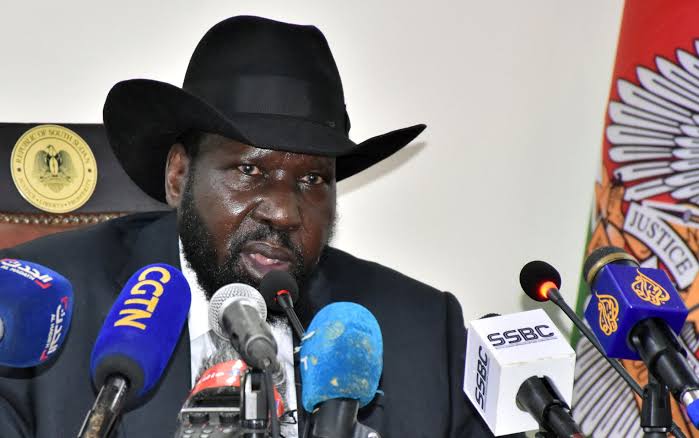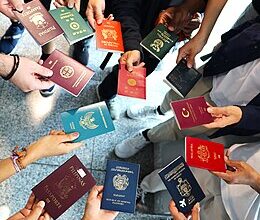
By Ibraheem Muhammad Mustapha
South Sudan, the world’s youngest country, attained independence on July 9 2011 amid tremendous hope and international acclaim. Its independence, the result of decades of struggle and self-determination, provided hope for a future of peace, prosperity, and democratic administration. However, the path to peace and democracy is fraught with challenges. At the forefront of disentangling this narrative is FactCheckAfrica, which, through diligent research on misinformation landscape in Africa, has unveiled a disconcerting causal link between the processes surrounding elections and the eruption of violence. This connection is alarmingly evident in South Sudan, where the deferment of elections has become a cyclical precursor to escalating tensions. This article embarks on a detailed exploration of how internal political dynamics, compounded by the influence of regional conflicts, threaten the fragile peace process and democratic aspirations of South Sudan.
The Genesis of Conflict in South Sudan
The seeds of discord in South Sudan were sown long before its secession from Sudan in 2011. The internal conflict is deeply rooted in historical grievances, ethnic rivalries and political power struggles. Notably, a civil war that lasted 7 years— between 2013-2018— erupted through the power struggle between President Salva Kiir and his deputy, Riek Machar, over leadership within the Sudan People’s Liberation Movement (SPLM) party. In December 2013, simmering tensions exploded into violence as clashes erupted between military forces loyal to Kiir and Machar, representing the Dinka and Nuer ethnic groups, respectively – the country’s two largest ethnic communities. The conflict quickly spiraled into a full-blown civil war, characterized by widespread atrocities and human rights abuses perpetrated along ethnic lines. The toll on human life has been staggering, with estimates suggesting more than 400,000 lives lost. Although currently classified as a low-intensity conflict, armed militias, often organized along ethnic lines, continue to perpetrate violence, creating a pervasive atmosphere of fear and trauma within the population. Today, South Sudan has the unenviable distinction of having the biggest proportion of its population (43%) as refugees in Africa, reflecting the scope of displacement and human suffering.
Despite several peace initiatives and accords brokered by regional and international parties, the conflict has continued, with periodic cease-fires followed by renewed violence. The peace agreement struck by Kiir and Machar in August 2015, mediated by the Intergovernmental Authority on Development (IGAD), failed to produce long-term calm, as violence flared up again shortly after Machar returned to Juba, the country’s capital, in April 2016. Following subsequent negotiations mediated by Uganda and Sudan, the Revitalized Agreement on the Resolution of the Conflict in South Sudan (R-ARCSS) popularly known as the Khartoum Declaration was signed in 2018. The accord contained a cease-fire and an agreement to explore a power-sharing solution. However, implementing these accords has proven difficult, and the fragile ceasefire is still vulnerable to breakdowns and violations. Efforts to hold elections within this volatile context are fraught with challenges, as political leaders leverage ethnic allegiances, deepening divisions and undermining the prospects for peace and unity.
The Perilous Impact of Election Postponements
The 2018 peace accord, which restored relative calm to the country, designated general elections as a cornerstone for consolidating peace and transitioning to a democratic governance structure. However, the shift from the ashes of conflict to the promise of democratic governance has not been easy. Election postponements in South Sudan have served as a barometer for the country’s instability. The initial election timeframe of 2022, which was later pushed back to 2023 and now 2024, highlights a deeper malaise impacting the peace process’s implementation. These postponements are symptomatic of a broader issue of delayed progress in meeting the peace agreement’s key conditions, such as drafting a permanent constitution and unifying the military’s command structure.
The continuous postponing of elections indicates a worrying pattern of prolonged political stasis. UN experts and observers have expressed doubts about the possibility of holding the elections on the amended timeframe, citing the slow pace of implementing the peace agreement’s terms. The electoral plan includes key preliminary activities such as conducting a national census and adopting a new constitution. These requirements are not only massive in scope, but they are also important to ensuring that the electoral process is inclusive, fair, and representative of the country’s diverse demographic and political context. Experts point to a more pernicious problem: a perceptible lack of political will among South Sudan’s authorities to push the election agenda. This hesitation is seen in the insufficient attempts to establish independent electoral supervision organisations, combat widespread corruption, professionalise the military, and, most importantly, commit to holding elections. The slowness surrounding these crucial reforms raises concerns about South Sudan’s ruling elites’ actual commitment to transitioning from a war-torn past to a future based on democratic values and sound governance.
Regional Conflict as an Impediment
Despite the renewed hope for transition into a democratic regime later in December 2024, current trends indicate that regional conflicts could have profound implications for its security, political stability, and developmental trajectory. Its neighbors include some of Africa’s most conflict-prone regions, including the Central African Republic (CAR), Democratic Republic of the Congo (DRC), Sudan, Ethiopia, Kenya, and Uganda. For instance, experts have previously warned that conflict in Ethiopia’s Tigray region, which officially ended in November 2022, could have a destabilizing effect on the region. Consequently, South Sudan, which shares a significant border with Ethiopia, has been affected by the resulting refugee flows and the regional security vacuum. The conflict in Ethiopia also diverts attention and resources from South Sudan’s peace process, as regional and international actors focus on quelling the unrest in Ethiopia.
Likewise, the conflict in Sudan, especially following the outbreak of violence in April 2023, has exacerbated tensions in South Sudan. The battle triggered a mass exodus of refugees into South Sudanese territory, straining the already fragile humanitarian situation. Available statistics shows that the largest group of refugees in South Sudan hails from Sudan, with 293,504 individuals accounting for 92.5% of the refugee population. Following Sudan, the Democratic Republic of the Congo contributes 16,802 individuals (5.3%), Ethiopia 4,250 individuals (1.3%), and the Central African Republic 2,231 individuals (0.7%). Additionally, a smaller contingent of 371 individuals (0.1%) comprises refugees from various other nationalities, further diversifying the refugee population within the country. Consequently, South Sudan’s intricate ethnic and political linkages with Sudan mean that instability across the border directly impacts its internal dynamics, potentially reigniting ethnic tensions and undermining the peace process.
Furthermore, the neighboring Democratic Republic of the Congo (DRC) further complicates South Sudan’s quest for democratic stability. President Félix Tshisekedi was re-elected in December 2023, and his Union Sacrée coalition dominated the parliament. Despite the relative success of the elections, the political landscape remains highly fragmented, notably in the eastern provinces of Ituri and North Kivu. The presence of the Allied Democratic Forces (ADF) in Ituri exacerbates instability, as they commit violence against civilians and target neighbouring Uganda. Despite Ugandan military efforts to end the ADF campaign since late 2021, attacks continue, endangering regional security and undermining efforts for peaceful coexistence. North Kivu province faces its own issues, as the 23 March Movement (M23) continues to fight the Congolese army. This movement, which is largely considered to have Rwandan backing, poses a huge threat to regional stability. The war not only contributes to internal displacement and human suffering, but it also has the potential to spread to neighbouring territories.
As armed groups operate across porous borders and ethnic tensions simmer, the spillover effects are significant, ranging from economic strain to exacerbating food insecurity and hindering the peace process. Furthermore, the resources allocated to manage regional crises may detract from domestic concerns, impeding progress towards democratic consolidation and long-term stability. Most significantly, the recurrence of violence and instability in these places jeopardises the larger regional stability required for peaceful elections and sustainable governance.
Conclusion
The route to democracy and peace in South Sudan is inextricably linked with the stability of the entire Northeast African area. As FactCheckAfrica’s research demonstrates, the causal link between election delays and violence is a serious concern that necessitates coordinated actions by regional and international actors. Understanding the complex factors at work, particularly the impact of neighboring wars, allows stakeholders to better assist South Sudan in charting its way to a peaceful and democratic future. The international community must prioritise holistic policies that address both internal difficulties in South Sudan and external pressures caused by regional instability. Only through such a comprehensive approach will the cycle of election-related violence be broken, paving the path for long-term peace and democracy in South Sudan and beyond.





Hi, this is a comment.
To get started with moderating, editing, and deleting comments, please visit the Comments screen in the dashboard.